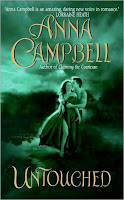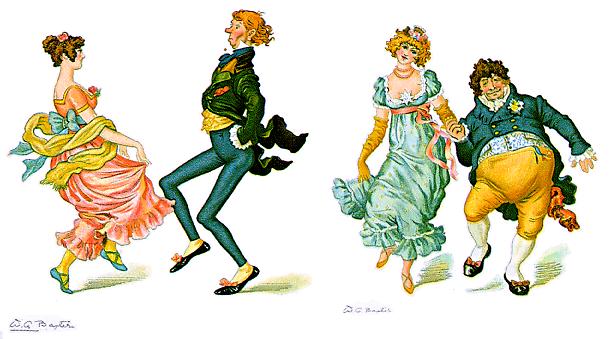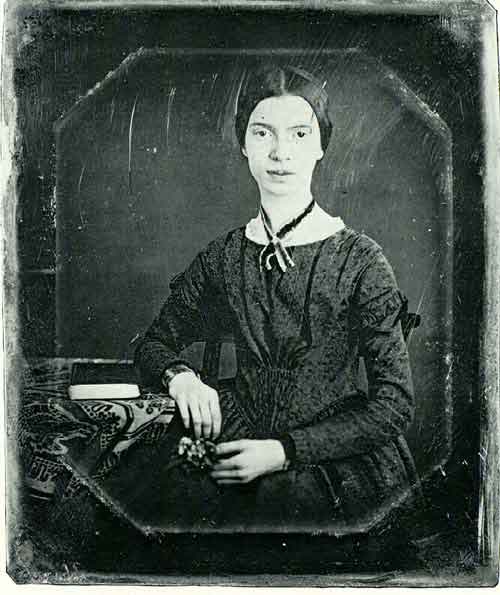
The Riskies are pleased to welcome Anna Campbell back to our drawing room! She is celebrating the release of her second book with Avon, UNTOUCHED…
1) It’s wonderful to welcome you back to Risky Regencies. What have you been up to since the last time we chatted?
 Amanda and Riskies, thank you so much for asking me back to chat. I had a fabuloso time last time I hung out (I hope you note the authentic Regency language here!). I’m looking forward to another fun day and to giving away a signed copy of the green monster to someone who leaves a comment.
Amanda and Riskies, thank you so much for asking me back to chat. I had a fabuloso time last time I hung out (I hope you note the authentic Regency language here!). I’m looking forward to another fun day and to giving away a signed copy of the green monster to someone who leaves a comment.
Life since we last chatted has been absolutely nutsoid. Ah, more Jane Austen influence sneaks into my prose! I’ve written my third “Regency noir” for Avon which will come out in October 2008. Just handed that in on 1st November. I’ve also had a big overseas trip. I had a month in the UK doing research. I soak up landscape and atmosphere and hang around stately homes and drive all the guides wild because I want to know EVERYTHING! I then went on to a week in New York followed by a week in Dallas for RWA Nationals where I got to meet some of my favorite Riskies in person. Although we didn’t get time to chat at length – something we’ll have to remedy in San Francisco next year. I’ve also joined a blog of Golden Heart finalists from 2006. There are 20 of us. When we started six months ago, four of us were published. Now we’re up to 11 which is a fantastic achievement. So generally these days, you can find me hanging out at Romance Bandits www.romancebandits.blogspot.com when I’m not trying to figure out a new way to torment my poor characters.

2) Your first book, Claiming the Courtesan, caused quite a stir! Were you expecting anything like that?
Ah, the famous hoo-ha, not to be confused with Jennifer Crusie’s equally famous glittery hoo-ha! Frankly, the scandal took me by complete surprise. When I wrote CTC, I was unpublished and I just assumed the book would go under the bed with all my other unpublished manuscripts. Then when I sold, I assumed nobody would pay any attention to my debut book at all! The longevity of the controversy astonished me. But then it was a true controversy – CTC divided people radically down the middle into lovers and haters.
3) The new book, Untouched, also has an unusual and intriguing set-up–a new widow kidnapped off the street and told she must seduce the “mad”, reclusive hero under pain of torture and death! Can you tell us more about this story? What was your inspiration?
Honestly, Amanda, I have NO idea where these off the wall ideas come from. Apart from out of my off the wall mind I’m not sure if you’d remember from last time we spoke (wouldn’t blame you if you don’t!) but CLAIMING THE COURTESAN came to me absolutely out of nowhere after I’d decided I was going to try and make a career in Regency romantic comedy. Anyway, I thought I’d never come up with a premise as inherently sexy as CTC again, basically because I never had before. So feeling very sorry for myself, I was lying in the bath and this idea popped into my mind of this woman strapped to a table and told she had to ‘amuse’ a madman or die. Hmm, fairly sexy, I thought. Especially as the ‘madman’ was going to be a gorgeous hero. UNTOUCHED is VERY gothic, even more so than CTC. There were a stack of influences from fairytales like Beauty and the Beast to the 19th century literary obsession with madness to old Victoria Holts I read as a teenager.
4) You might not think it from this unpromising beginning to True Love, but Grace and Matthew really felt like they “fit” together, they were meant to be. At least I, Amanda, felt like they did! How did you come up with these two?
Thank you, Amanda. That was a lovely compliment. I really try and make sure my hero and heroine have qualities in common that aren’t immediately apparent so there’s a soul connection as well as the immediate physical attraction. Sadly, there’s been a lot of serious illness in my family in recent years and I started thinking about heroism that moves beyond the obvious. You know, the sort of heroism that suffers and endures and requires endless, unspectacular courage. That’s the sort of heroism both Grace and Matthew demonstrate. So even though their outer circumstances are quite different, at a base level, they really have faced similar trials and emerged stronger for their suffering.
5) What are some of your favorite research sources for this 1820s period?
I love this decadent period before Victoria took the throne but after the Regency proper, although obviously for sales reasons, the books are marketed as Regency historicals. I first became interested in these years when I read the marvelous romances Loretta Chase set in the same era, although obviously LC’s books and mine have a completely different feel. The more nonfiction I read about the time, the more interested I became. It’s exactly the background for Regency noirs! For UNTOUCHED, I did a lot of research into the treatment of madness in the 19th century (and goodness, would some of that curl your hair with horror!). A book I used a lot was Roy Porter’s MADMEN which was published in the UK under the much more evocative title of ‘Mind-Forg’d Manacles’.

6) So–what about that avocado farm? 🙂
Snort! I grew up on an avocado farm on the south coast of Queensland in Australia. A very beautiful spot, by the way. I can still spot any avocado variety at 20 paces. Strangely, not a skill that has yet earned me any money! Some interesting facts about avocadoes – our collie dog absolutely loved them and used to bump against the branches until the avocadoes dropped off. He’d worked out when they fell, they started to ripen (he was a VERY clever dog). He’d then come back when they were ripe and eat them so delicately that only the thinnest, most perfect skin was left and a completely bare seed. Neat, huh? Foxes like to eat avocadoes too! And we had terrible trouble with crows because they used to peck the fruit on the trees to see if it was ripe and if it wasn’t, they’d just move onto the next fruit. Of course, that damaged fruit was then unsuitable for sending to market. Crows were not popular with the family!
7) We’re starting our “Austen Week” tomorrow, leading up to The Birthday on December 16th. What’s your own favorite Austen novel?
Amanda, what a fantastic question. I adore Jane Austen. Actually I’ve yet to meet a romance writer who doesn’t love Jane and recognize her and the marvelous Brontes as the geniuses who are the source of our wonderful genre. My favorite JA is PERSUASION. There’s so much heart and feeling in that story. Although I waver because I love PRIDE AND PREJUDICE with all it sparkle and wit and has there ever been a better romance hero than Mr. Darcy? I think not! Speaking of the Jane Austen birthday, the Riskies have inspired me to have my own celebration on the 10th December over at my regular blog Romance Bandits. I’ll celebrate all things Jane and give away an ARC of THE LOST MEMOIRS OF JANE AUSTEN by Syrie James. Pop by if you get a chance! And I’d love to come and play with you guys during your Austen week too! You can’t have too much Jane, can you?
(Definitely not enough Jane–and Persuasion is my favorite, too! –Amanda)
8) What’s next for you?
I just handed in my third Avon historical romance TEMPT THE DEVIL which at present is scheduled for October, 2008. It’s another dark and sensual story that I’m calling a Regency noir AFFAIR TO REMEMBER. Although I suspect I’m the only person who will get the connection. It’s another courtesan story although the hero and heroine are older and more cynical than Kylemore or Verity. My pitch when I told my editor about it was that these two people have seen everything and done everything and yet felt nothing. Falling in love is the greatest risk they can take. My fourth book will probably be closer to the feeling of UNTOUCHED than TTD. I’m going to start serious work on that after Christmas. I’ve got a great idea for more tortured characters 😉
Comment on the post to win a copy of Untouched (aka The Green Monster)! And to keep track of all the upcoming interviews and giveaways, sign up for the Riskies newsletter at riskies@yahoo.com…


 from Wikipedia: Although the plot favors the value of sense over that of sensibility, the greatest emphasis is placed on the moral complexity of human affairs and on the need for enlarged and subtle thought and feeling in response to it.
from Wikipedia: Although the plot favors the value of sense over that of sensibility, the greatest emphasis is placed on the moral complexity of human affairs and on the need for enlarged and subtle thought and feeling in response to it. 1. Sense and Sensibility is primarily a love story. A Romance. No matter the other themes of the book, romance is central. From the beginning we root for Elinor and Marianne to find love and have a happily ever after.
1. Sense and Sensibility is primarily a love story. A Romance. No matter the other themes of the book, romance is central. From the beginning we root for Elinor and Marianne to find love and have a happily ever after.









